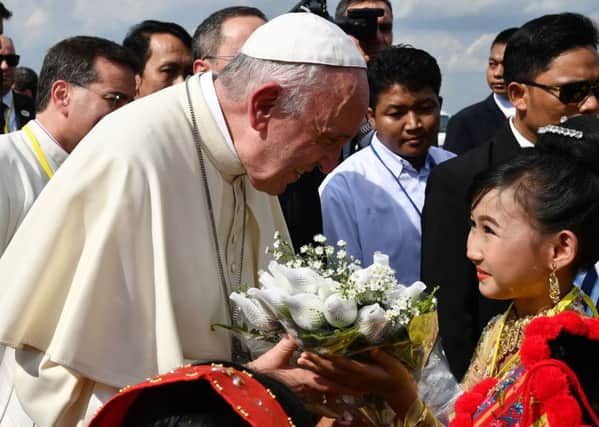Pope Francis tackles Rohingya crisis as Myanmar trip begins


He met with Myanmar’s military chief, even before beginning the official program of his trip.
The Vatican did not provide details of the contents of Francis’ 15-minute “courtesy visit” with General Min Aung Hlaing and three officials from the bureau of special operations.
Advertisement
Hide AdAdvertisement
Hide AdIt took place in the residence of the archbishop of Yangon, Cardinal Charles Bo, who has resisted international condemnation of the military’s operations against Rohingya as “ethnic cleansing”.
The general is in charge of security in Rakhine state, where the military’s “clearance operations” against the Muslim minority have sent more than 620,000 Rohingya fleeing into neighbouring Bangladesh.
Refugees there have told of entire villages being burned and women and girls being raped.
Vatican spokesman Greg Burke said: “They spoke of the great responsibility of the authorities of the country in this moment of transition.”
General Min Aung Hlaing’s office said in a statement on Facebook that he is willing to have “interfaith peace, unity and justice”.
The general added that there was no religious or ethnic persecution or discrimination in Myanmar, and that the government allowed different faith groups to have freedom of worship.
Rohingya Muslims have faced state-supported discrimination in the predominantly Buddhist country for decades. Though members of the ethnic minority first arrived generations ago, Rohingya were stripped of their citizenship in 1982, denying them almost all rights and rendering them stateless.
They cannot travel freely, practise their religion, or work as teachers or doctors, and they have little access to medical care, food or education.
Advertisement
Hide AdAdvertisement
Hide AdOriginally, the meeting was planned for tomorrow, after Francis was to have met with the country’s civilian leader, Nobel Peace Prize laureate Aung San Suu Kyi. The Vatican did not say why it was moved up. Rohingya in recent months have been subject to what the United Nations says is a campaign of “textbook ethnic cleansing”.
But Myanmar’s Catholic Church has urged Francis to avoid using the term “Rohingya”, which is shunned by many locally because the ethnic group is not a recognised minority in the country.
Francis has already prayed for “our Rohingya brothers and sisters” and much of the debate in the run-up to the trip focused on whether he would do so again.